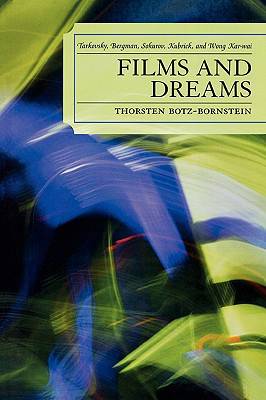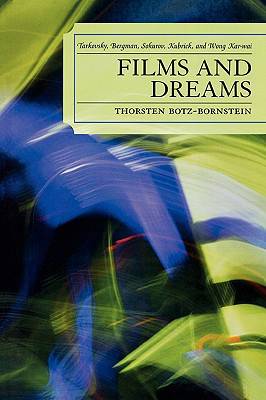
- Afhalen na 1 uur in een winkel met voorraad
- Gratis thuislevering in België vanaf € 30
- Ruim aanbod met 7 miljoen producten
- Afhalen na 1 uur in een winkel met voorraad
- Gratis thuislevering in België vanaf € 30
- Ruim aanbod met 7 miljoen producten
Zoeken
Films and Dreams
Tarkovsky, Bergman, Sokurov, Kubrick, and Wong Kar-Wai
Thorsten Botz-Bornstein
Paperback | Engels
€ 99,95
+ 199 punten
Omschrijving
Films and Dreams considers the essential link between films and the world of dreams. To discuss dream theory in the context of film studies means moving from the original, clinical context within which dream theory was originally developed to an environment established by primarily aesthetic concerns. Botz-Bornstein deals with dreams as "self-sufficient" phenomena that are interesting not because of their contents but because of the "dreamtense" through which they deploy their being. A diverse selection of films are examined in this light: Tarkovsky's anti-realism exploring the domain of the improbable between symbolization, representation and alienation; Sokurov's subversive attacks on the modern image ideology; Arthur Schnitzler's shifting of the familiar to the uncanny and Kubrick's avoidance of this structural model in Eyes Wide Shut; and Wong Kar-Wai's dreamlike panorama of parodied capitalism.
Specificaties
Betrokkenen
- Auteur(s):
- Uitgeverij:
Inhoud
- Aantal bladzijden:
- 176
- Taal:
- Engels
Eigenschappen
- Productcode (EAN):
- 9780739121887
- Verschijningsdatum:
- 1/08/2008
- Uitvoering:
- Paperback
- Formaat:
- Trade paperback (VS)
- Afmetingen:
- 154 mm x 228 mm
- Gewicht:
- 272 g

Alleen bij Standaard Boekhandel
+ 199 punten op je klantenkaart van Standaard Boekhandel
Beoordelingen
We publiceren alleen reviews die voldoen aan de voorwaarden voor reviews. Bekijk onze voorwaarden voor reviews.







